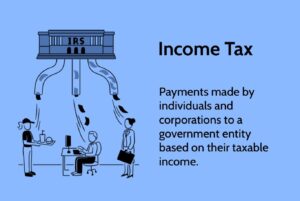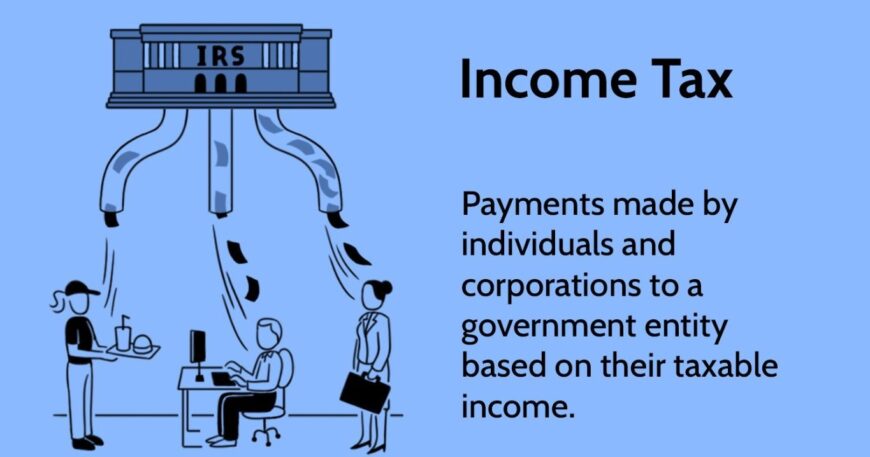Income Tax Guide 2024:
It is an indispensable subject of personal finance for everyone currently earning a source, including employees and self-employed. Even income from investments Income tax is a crucial thing in one’s life while he is working, and earning through different sources; hence, tax season is about knocking on doors, so an understanding of the important matters, like Income Tax Brackets, the earned income tax credit, and filing a tax return deadline, is indispensable. Therefore, Syed Professional Services will focus on bringing clarity to this crucial topic, especially this year (2024).
Understanding income tax is important for compliance and informed financial decisions. In this article, we will break down everything you need to know about income tax and its related components for 2024, ensuring that you are ready when tax season arrives.
What is income tax?
Income tax is the amount that governments collect from the financial earnings of individuals and businesses. In the United States, it is collected by the Internal Revenue Service (IRS) and goes to finance different public services, including infrastructure, education, and healthcare. And so much more. Individuals and businesses pay a percentage of their income according to the tax brackets, and the payment is usually done yearly during tax season.
Income tax falls due on wages, salaries, bonuses, interest, dividends, and all other income. The amount that one needs to pay is dependent upon total income, deductions, and exemptions.
Income tax is also perceived as a progressive tax system in many ways, where the higher one’s earnings are, the more one is taxed. But this can be misconstrued unless understood from the structure of income tax brackets, which we discuss next.
Income Tax Brackets: Understanding the Tax System
Income tax brackets are the levels at which taxable income falls in various tax rates. These tax brackets are established by the IRS and are changed each year to reflect inflation. Income tax brackets, therefore, define how much of your income will be taxed at what rate. With higher income, the tax rate on the income is also higher.
For example, the income tax brackets for individuals range from 10% to 37%, depending on the level of taxable income. Let’s look at a general overview of the income tax brackets for 2024:


As shown in the table above, the 2024 income tax brackets are progressive. This means that, once your income exceeds a certain threshold of a bracket, only that amount is taxed at a higher rate. For example, for a single filer, if you make $50,000, only the last $5,000 will be taxed at 22%, but the remaining amount will be taxed at the lower rate of 10% and 12%.
How Much Is Income Tax?
Your income tax liability depends on your taxable income and any deductions you claim. Your taxable income is essentially the gross income that you deduct from any relevant deductions, exemptions, and credits that you are qualified for. These may include student loan interest, mortgage interest, and contributions to retirement accounts.
To calculate how much income tax you will pay, you’ll need to:
Calculate your taxable income by subtracting deductions such as the standard deduction from your total income.
Use the income tax brackets to determine how much you have to pay based on your taxable income.
If you have already paid income tax withheld from your paycheck during the year. You will subtract this from your total tax liability to see if you owe or if you are due a refund.
Earned Income Tax Credit (EITC)
Among the most important tax credits for eligible low- and moderate-income workers is the Earned Income Tax Credit. The EITC is a refundable tax credit that is intended to reduce the amount of taxes paid by working people and families who have children.
The Earned Income Tax Credit provides tax relief for taxpayers through a reduction in the tax owed or an increase in the refund amount. For one to qualify for EITC, one must meet specific income thresholds. The amount one is going to receive is a product of income, filing status, and the number of children one has.
What Is the Earned Income Tax Credit?
The Earned Income Tax Credit is a credit that is designed to help lower-income workers by reducing their overall tax burden. It is a progressive tax credit, meaning the more you earn, the less credit you may qualify for. In some cases, if you qualify for the EITC, you may receive a refund, even if you don’t owe taxes.
To qualify for the Earned Income Tax Credit in 2024, you must meet specific criteria based on the following:
Your filing status
Your income level (which must be within the eligible range)
The number of qualifying children you have
Your age (if you don’t have children, you must be between 25 and 64 years old)
For instance, if you’re a single parent without children, The EITC may give you a significant refund if your income falls within the eligible range.
Benefits of the EITC
For many eligible taxpayers. The EITC is a great tool to reduce the tax liability amount and sometimes leads to a refund. The EITC can help families with three or more qualifying children reach as much as $7,430 in 2024.
Deadline for Filing Income Tax Returns with Extensions
You can file for an extension with the IRS if you want to extend the deadline for filing your income tax return. However, it is worth noting that even if you are granted an extension, The extension only applies to the time to file, not the time to pay.
For most taxpayers, the deadline to file 2024 income tax returns is April 15, 2025. If you have filed an extension, your deadline will be October 15, 2025. Note that although you may file for an extension, any taxes that are due must be paid by the original deadline or you will incur interest and penalties.
If you are having difficulties filing your tax return before the deadline, then seek professional help. Syed Professional Services will help you in the process of filing income tax returns while ensuring that all deadlines are met and you pay the right amount of taxes.
Conclusion
Understanding income tax, from income tax brackets to the Earned Income Tax Credit and deadlines for filing. Can help you navigate through tax season without a problem. At Syed Professional Services, we are here to provide you with expert guidance and services in understanding these important tax topics.
If you need help with filing your taxes, Understanding the earned income tax credit, or navigating tax deadlines, we are here to help you today. We want to make sure your tax situation is handled efficiently and accurately so that you can focus on what matters most.
FAQs
What is income tax?
Income tax is a levy that the government collects from individuals in the form of wages, salaries, bonuses, and other forms of income. This helps fund public services and infrastructure.
How much income tax do I owe for 2024?
The amount of income tax you owe is a function of your taxable income, deductions. And the income tax brackets applicable to your filing status. You can use the tax brackets from the IRS for 2024 to approximate the amount of tax you will pay.
What are the income tax brackets for 2024?
For the tax year 2024. The income tax brackets for a single filer run from 10% to 37%, depending on levels of income. For married couples filing jointly, the brackets run from 10% to 37%.
What is the Earned Income Tax Credit (EITC)?
The Earned Income Tax Credit is a refundable tax credit meant to assist low. And moderate-income individuals and families reduce their tax burden. Your income, filing status, and number of children will determine the amount for which you qualify.
How and when are income tax returns filed in 2024?
April 15, 2025, is the deadline to file your 2024 income tax return. October 15, 2025, is the new deadline if you file an extension.
Can I file for an extension of my taxes?
Yes. You can file for an extension to file your return, but the extension just postpones the deadline date. Taxes owed must still be paid by the initial deadline date to avoid any penalties.



